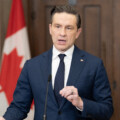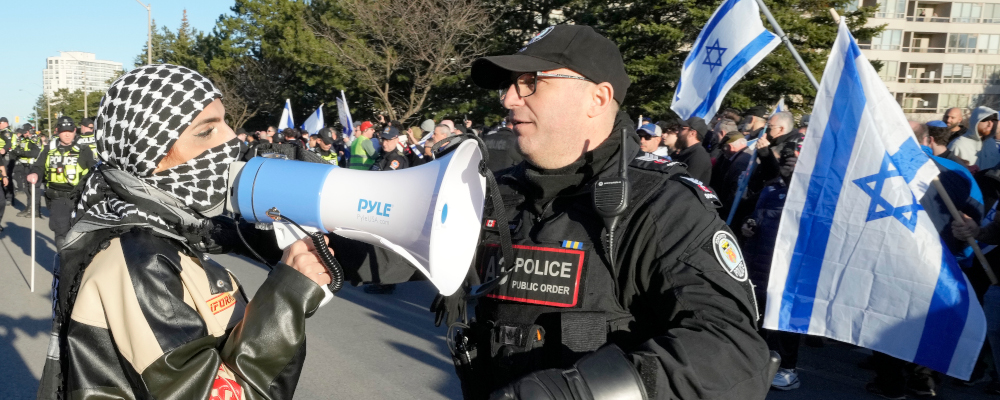This is a post I never thought I would need to write in 2024. I have been a law professor at the University of Ottawa for nearly 26 years, and the principle that all students, regardless of race, gender, religion, or sexual orientation have the right to be safe and feel safe on campus and in classrooms has been inviolable and accepted as central to our academic mission. Indeed, over the years I have seen and supported colleagues’ efforts to ensure that we practice what we preach on inclusivity and ensuring a community free from harassment and discrimination. I believe the same to be true at academic institutions across the country. Yet since October 7th, something has changed.
Last week, Jewish students from multiple universities appeared at a national press conference and before the House of Commons Justice Committee. They provided deeply troubling accounts of why many Jewish students are no longer safe—or do not feel safe—on campus and in some classrooms. The students spoke of physical violence, threats, and harassment simply for being Jewish. When asked, each said they did not feel safe on campus and warned of “the normalization of antisemitic rhetoric through inaction by university administrators, who fail to use even their own policies and their own code of conduct to act against antisemitism on their own campuses.”
The response to these accounts has frankly shocked me. If this was any other group, I believe the testimony would spark urgent calls to address the concerns alongside strong commitments from politicians and university leaders pledging to ensure that all feel safe. Yet in the days since the hearing, some have argued that while there is a right to be safe, there is no right to feel safe. I’ve seen professors criticize students from their own faculty, even as those students provided evidence of exclusion or discrimination from classes or public spaces on campus. Others argue that the lack of safety is deserved since those students’ views or affiliations make them a legitimate target or that feeling safe creates an unworkable standard.

To be absolutely clear, Jewish students have the right to be safe and feel safe just like any other student. There is no shortage of stories and studies focused on incidents involving LGBTQ students feeling unsafe, women feeling unsafe, Black students feeling unsafe, and Muslim students feeling unsafe. I can never recall anyone responding to those issues by arguing that those students have no right to feel safe or by dismissing their concerns on the grounds that somehow their fears are unwarranted or are being used as a weapon against others.
That only Jewish students seemingly elicit this response is antisemitism. Indeed, open antisemitism, Jewish exclusion or hate, denial of the right to hold legitimate views on the right of Israel to exist, and to express one’s political beliefs or religion are under active threat right now. It matters little that some Jewish students claim to still feel safe since there is ample evidence that many do not in communities in which policy dictates that everyone has the right to feel safe.
There is good reason for policies that emphasize the need for students to feel safe. Studies unsurprisingly find that there is a correlation between safety and academic performance as students cannot be expected to perform at their best if they feel unsafe. Further, safety is directly linked to mental health, which has become an increasing focus of concern for universities. Students’ freedom of expression and freedom of association rights are also directly implicated as safety fears often lead to the uncomfortable decision to hide one’s identity, restrict participation in campus activities, or refrain from speaking out. You cannot argue in favour of expression—as I see some doing in the context of some encampments on campus that have violated university policies—and then simply ignore or dismiss the expression and association rights of Jewish students.
I write this post having just concluded teaching an annual joint course on global technology law with students and faculty from the University of Ottawa, University of Haifa, and Bocconi University. The course brings together an incredible array of participants with different backgrounds, perspectives, and religions. It once again affirmed the importance of academic exchange and why calls for boycotts are so wrongheaded. But I mention the course not because of those values, but to note that this was the first time in ten years that I was forced to remove publicly available classroom information due to safety concerns. In fact, it was also the first time that campus security was alerted to the existence and location of the class.
Safety was a real issue, and the experience reinforced in a personal way that some students and faculty do not feel safe on campus right now. Universities are failing to uphold their own policies, and, in doing so, failing to live up to their own ideals as inclusive institutions in which all feel welcome and safe.
This column originally appeared at michaelgeist.ca.
Recommended for You

‘They seem to have been caught flatfooted by the Trump phenomenon’: Andrew Coyne on the federal election race and the future of Canadian conservatism

‘The Canadians are not being thrown out any time soon’: Richard Kerbaj on whether Trump will kick Canada out of the Five Eyes

Philip Deck: Canada needs its own domestic drone strategy if it wants to be serious about defence

Patrick Luciani: The death of reason in the age of Trump



